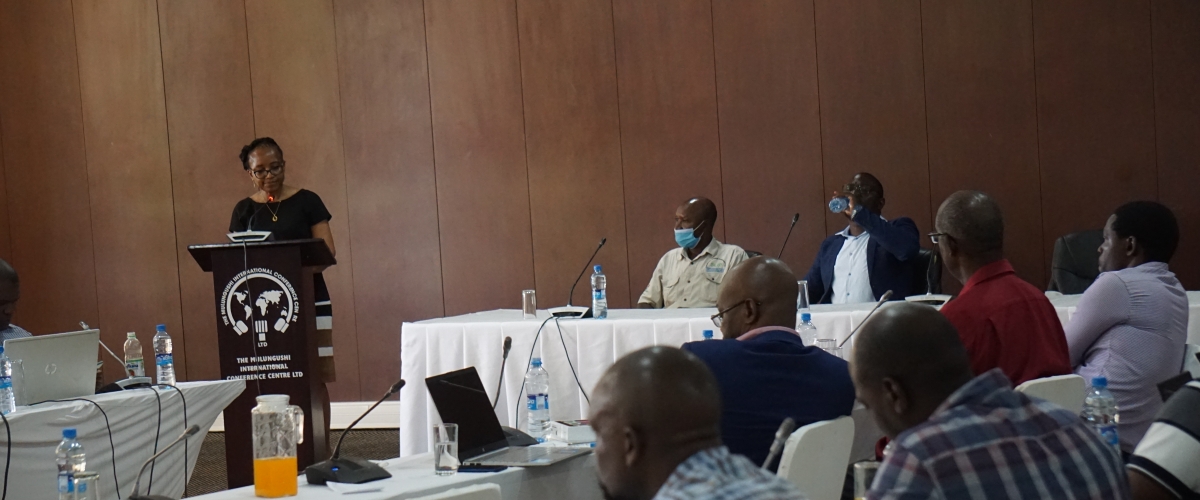
By Happy Mulolani
A major concern that has arisen in most institutions and organizations is lack of better systems which provide information aptly to its clients or users. The downside of this situation has meant most organizations have depended on a manual system which is not efficient to store and provide information to the public, which has had ramifications on the public’s inability to easily access information due to lack of a systematic and organized system.
Amidst this challenge, the best approach is to provide an online system which better positions users to store, retrieve and share information to the public, in a manner which is easily accessible.
The Enhanced Smallholder Agribusiness Promotion Programme (E-SAPP) with financial support from the International Fund for Agricultural Development (IFAD) has come up with a web enabled Management Information System (MIS) which provides for experts and agriculture staff to capture, store and share information on the Programme interventions in a systematic and efficient manner to its target farmers and the public. The unique feature about this application is that it has a web portal and mobile application. This integrated system is expected to pertinently provide information to all the districts countrywide. The system has been developed by the University of Zambia and Smart Zambia Institute.
Some modules have been designed on the system and these include; Activity Work Plan Budget (AWPB) Module, Monitoring & Evaluation Module, Matching Grants Module and Knowledge Management, among others. These provide the leverage for users to engage with the system but also for the public, especially farmers whom the programme primarily targets to appropriately provide feedback.
Agriculture staff from the 10 provinces recently convened at the Mulungushi International Conference Centre in Lusaka for a four days training on the utilization of the system. Participants included; Provincial Agricultural Planners, District Marketing and Development Officers and District Agricultural Information Officers as well as staff from E-SAPP were trained as Trainer of Trainers. The Trainer of Trainers are expected to further train extension staff and other subject matter specialists involved in the execution of the Programme interventions in their respective districts.
Ministry of Agriculture Policy and Planning Director, Peggy Mlewa expressed happiness that the Management Information System has finally been completed, noting that the system will expedite Programme information capture and sharing in an efficient manner.
“Given the programme’s mandate of promoting increased production, nutrition and incomes, the development and deployment of this robust management information system will enhance management planning and also track and provide information at the right time,” Ms Mlewa said.
She explained that the Programme plays a critical role in the agriculture sector as it assists farmers in terms of market access, aggregation facilities, matching grants, among others.
Ms Mlewa urged staff to take advantage of the knowledge transfer to the districts and sub-district levels as the consultants will be on hand to provide user support for six months to resolve any teething problems and perfect the system.
Enhanced Agribusiness Promotion Programme, Programme Coordinator, Emmanuel Mulenga disclosed UNZA and Smart Zambia were engaged as consultants to develop the Management Information System (MIS) in a bid to contribute to the systematic and efficient manner of Programme information sharing.
“The Programme is in its 5th year of implementation with footprints in 10 provinces with interventions being offered in 20 focal districts. Over 500 learning clusters have been established, with 40,000 farmers trained, who have now graduated. Some of these farmers have been financed in their selected value chains,” Mr Mulenga said.
He emphasized with the management information system now in place, information flow to farmers who are already organized in groups will be enhanced.
“The rolling out of the management information system will simplify processes of planning, monitoring and evaluation reporting contributions of the Programme interventions,” he said.
One of the participants, Principal Agricultural Planner for Muchinga province, Mwaba Mwansa said the system will ensure farmer groups applying for matching grants are promptly advised on the status of their applications for their selected commodity of focus.
While, District Agricultural Information Officer for Mungwi district in Northern province, Susan Tumbo said the training was timely as it better positions farmers’ to access information on case studies which gives insights of the Programme interventions.
“The training is useful to me as a district based staff because I will be able to easily provide content which will be shared in a short time unlike the long processes in the past,” she said.
The Programme procured 30 computers and 150 iPads to facilitate users in focal districts to make use of the system to enable them store, retrieve and share information from the districts and sub-district levels. The provision of these electronic devices will ensure trained staff navigate the system and also provide required information promptly.
The rolling out of the Management Information System will enhance making informed decisions through the programme’s trajectory. It is also a milestone achievement for the Programme to finally roll-out a functional system, which is expected to provide timely information in an organized and efficient manner to its target farmers, stakeholders and the public.
The author is a Principal Agricultural lnformation Officer at National Agriculture Information Services





